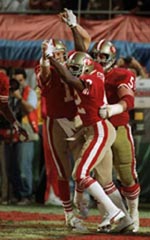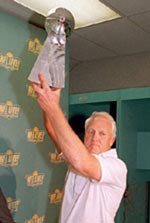Just a 92-Yard Walk in Park
(Editor's Note: This story is reprinted from the Official Super Bowl XXXIII Game Program)
Joe Montana was at a career crossroads. In his tenth pro season, the 49ers quarterback was showing signs of wear. A ruptured disc in his back, which required surgery, threatened to end his career in 1986. He came back, but elbow surgery, back spasms, and bruised ribs forced him to miss parts of six regular-season games in 1988.
All signs indicated the Montana era was coming to an end in San Francisco. Coach Bill Walsh benched Montana in favor of Steve Young in a 1987 playoff loss to Minnesota. Such a move would have been unthinkable a few years earlier, but Montana, at 32, seemed less of a magician and more, well, an ordinary Joe. The 26-year-old Young seemed the rising star.
During the 1988 preseason, Walsh was asked if he had any worries. "We may have a quarterback controversy," he said, opening the door to speculation about Montana being phased out, benched, or even traded. Montana's most-valuable-player performances in Super Bowls XVI and XIX were faded memories, or so they seemed.
Montana was the starter in Week 1 of the 1988 season, but he reinjured his elbow in a 34-33 victory at New Orleans. Young started the following week, Montana the next. Back and forth it went through the first half of the season. It hardly was surprising that the offense was out of sync. After 11 games, the 49ers were 6-5 and barely alive in the playoff race.
At that point, Walsh fully committed to Montana, and the team rallied behind him. The 49ers won four of their last five regular-season games, then destroyed Minnesota (34-9) and Chicago (28-3) in the NFC playoffs to earn a trip to Super Bowl XXIII at Miami's Joe Robbie Stadium.
 |
In that game, playing the Cincinnati Bengals, Montana assured his place in football history. A career that just a few months earlier appeared to be in its twilight took on new and even great luster as Montana led the 49ers the length of the field in the closing minutes to win 20-16. He threw the winning 10-yard touchdown strike to wide receiver John Taylor with just 34 seconds left on the clock.
It was one of those pressure-packed drives - such as the overtime drive led by Baltimore's Johnny Unitas in the 1958 NFL Championship Game, or John Elway's 98-yard drive against Cleveland in the 1986 AFC title game - that defines a great quarterback. And no quarterback ever appeared as much in control as Montana did on that final possession against the Bengals.
Montana led his team 92 yards in 11 plays over 2 minutes and 46 seconds. What's more, he made it look easy. He completed 8 of 9 passing attempts, and his lone incompletion was a deliberate throwaway. That was the hallmark of Montana's greatness. He could make playing quarterback in the NFL look ridiculously easy. He could make winning Super Bowls look easy, which other quarterbacks know it is not. Just ask Dan Marino and Jim Kelly.
Years from now, when people talk about Montana's career, they will talk about Super Bowl XXIII. He played a total of 16 seasons and he won four league championships, yet that one drive will be where the legend was validated. It is a curiosity that Montana's biggest victory came at the end of an otherwise mediocre season (he was the seventh-ranked passer in the NFL in 1988) in his only Super Bowl in which he was not named MVP (Jerry Rice won the honor in this game).
"That game is certainly my fondest memory," Montana says. "Driving a team in the last minute and throwing a touchdown pass to win the Super Bowl - that's the kind of thing you dream about as a kid."
"It was a game that brought out the best in Joe," Walsh says. "That was one of the great drives in football history, and every one of the calls was dependent on Joe exercising his discipline and his decision-making ability. Joe was perfect in every respect. He was physically, mentally, emotionally in control. To watch Joe on that series, you were watching the greatest quarterback of all time."
For a game with such a dramatic ending, the first three quarters were rather uneventful. The 49ers and Bengals were tied 6-6 - all the points had come on field goals - until Stanford Jennings returned a kickoff 93 yards for a touchdown that put Cincinnati ahead 13-6 in the final minute of the third period. Montana tied the score with a 14-yard pass to Rice early in the fourth quarter. The Bengals took a 16-13 lead on Jim Breech's 40-yard field goal with just 3:20 left to play.
|
Super Bowl XIX Flashback
|
The 49ers were penalized for an illegal block on the ensuing kickoff, and began their final drive from their 8-yard line. Watching from the bench, Cincinnati receiver Cris Collinsworth recalls hearing a Bengals teammate say: "We got 'em." Collinsworth asked if number 16 was in the San Francisco huddle.
"Yeah," the player replied.
"Then we haven't got 'em," said Collinsworth, who had played for the Bengals team that lost to Montana and the 49ers 26-21 in Super Bowl XVI.
The 49ers' offense was standing in the end zone, waiting to begin its drive. Most of the players were shuffling nervously during the television time out. They were trailing by three points with three minutes to go, pinned to their own goal line. Only Montana seemed oblivious to the pressure. He was gazing around the stadium, taking in the scene.
"Joe said, 'Hey, check it out, there's John Candy,'" tackle Harris Barton says. "I looked up and there was John Candy in the stands, eating popcorn. I'm thinking, 'Yeah, wow.' Then it's like, 'What the heck am I doing? I've got to get my head in the game.' The ref blew his whistle and Joe said, 'Okay, here we go.' He called the play and off we went."
"Joe has a natural instinct for competition," Walsh says. "He's able to play in the most difficult situations totally relaxed, almost placid. It's an innate thing that is not coached. He probably had it when he was growing up, playing high school football. It's a marvelous quality because it affects all the people around him, including coaches."
"I tried to be the same, whether we were winning or losing, first quarter or fourth quarter," Montana says. "Sometimes you see players come out of character. Late in a game, they get hyper and that's a mistake because it sends a signal to the other players. It's like, 'This isn't right.' The minute you change, they change."
Montana began the drive with safe passes to Roger Craig (8 yards), tight end John Frank (7), and Rice (7). Two carries by Craig gained another five yards. Montana then hit Rice for 17 and Craig for 13. The 49ers had a first down at the Bengals' 35-yard line.
Cincinnati coach Sam Wyche was wearing a microphone for NFL Films, and as Montana drove the 49ers into Bengals' territory, Wyche was heard saying: "This is deja vu." As a 49ers assistant years earlier, Wyche had seen Montana do this sort of thing many times before.
"We just kept the pressure on them," Montana says. "I made sure we got something out of every play. If I had somebody open right away, even if he wasn't my primary receiver, I gave it to him and let him gain five yards. Just so we had something positive on every play."
 |
Montana calmly hit Rice down the middle for 27 yards. San Francisco had first down at the 18. Next play, Montana passed to Craig for 8 yards. The 49ers called time out with 39 seconds remaining. A chip-shot field goal would tie the score and force overtime. Walsh warned Montana to be careful. Don't force a bad pass and wind up turning over the ball.
Montana nodded, but when he returned to the huddle, he was thinking one thing: touchdown.
The play was "20 halfback curl, X-up." Craig was the primary target, but if the safety went with him, Taylor should be open.
It was good call, but Craig lined up on the wrong side. He still ran the route, the safety went for the fake, and Montana threw a strike to Taylor cutting through the end zone.
Some camera angles made it look like an easy pass. Viewed from above, Taylor appeared wide open. But the camera behind Montana showed there actually was a narrow space between the cornerback and safety, a window of a few feet, open for a fraction of a second. Montana found it just before it slammed shut.
Was it a risky throw?
Not for Joe Montana.
The following year, Montana came back and won his fourth Super Bowl, this time a 55-10 blowout of Denver. He finished his career with almost every Super Bowl passing record, including a 68-percent completion rate, 11 touchdown passes, and no interceptions in 122 attempts.
"Some guys get tighter the bigger the game is, but Joe just seemed to get better," former 49ers guard Randy Cross says. "If every game were a Super Bowl, Joe would have retired undefeated."

